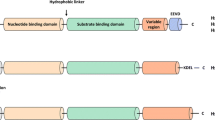Abstract
Radicicol, a macrocyclic anti-fungal antibiotic, has the ability to suppress transformation by diverse oncogenes such as Src, Ras and Mos. Despite this useful property, the mechanism by which radicicol exerts its anti-transformation effects is currently unknown. To understand the transformation-suppressing effects of radicicol, a biotinylated derivative of radicicol was chemically synthesized and used as a probe in a Western-blot format to visualize cellular proteins that interact with radicicol. In transformed and untransformed mouse fibroblasts, the most prominent cellular protein that bound to radicicol had a molecular weight of approximately 90 kDa. Further analysis revealed that this protein was the mouse homologue of the 90 kDa heat shock protein (HSP90). This was confirmed by demonstrating the ability of radicicol to specifically bind purified human HSP90. Specificity of binding was demonstrated by the inhibition of binding of biotinylated radicicol by the native drug. Taken together with other studies the present observations suggest that the anti-transformation effects of radicicol may be mediated, at least in part, by the association of radicicol with HSP90 and the consequent dissociation of the Raf/HSP90 complex leading to the attenuation of the Ras/MAP kinase signal transduction pathway.
Similar content being viewed by others
Author information
Authors and Affiliations
Rights and permissions
About this article
Cite this article
Sharma, S., Agatsuma, T. & Nakano, H. Targeting of the protein chaperone, HSP90, by the transformation suppressing agent, radicicol. Oncogene 16, 2639–2645 (1998). https://doi.org/10.1038/sj.onc.1201790
Received:
Accepted:
Published:
Issue Date:
DOI: https://doi.org/10.1038/sj.onc.1201790
- Springer Nature Limited
Keywords
This article is cited by
-
Natural Products of the Fungal Genus Humicola: Diversity, Biological Activity, and Industrial Importance
Current Microbiology (2021)
-
HOS1 activates DNA repair systems to enhance plant thermotolerance
Nature Plants (2020)
-
Beta resorcylic acid lactones (RALs) from fungi: chemistry, biology, and biosynthesis
Archives of Pharmacal Research (2020)
-
Targeting the Hsp90-Cdc37-client protein interaction to disrupt Hsp90 chaperone machinery
Journal of Hematology & Oncology (2018)
-
Hyperactivation of HUSH complex function by Charcot–Marie–Tooth disease mutation in MORC2
Nature Genetics (2017)




